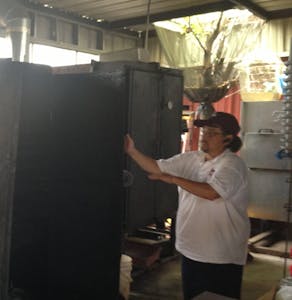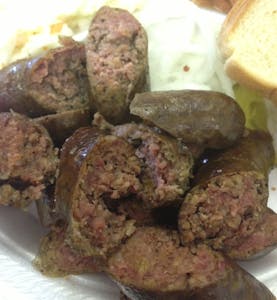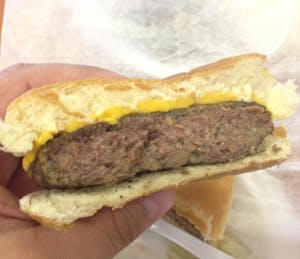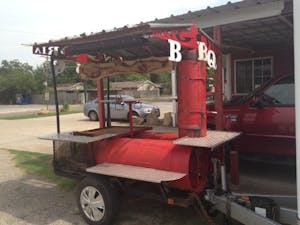Owner/Pitmaster: Longoria’s BBQ, opened 1995
Age: 50
Smoker: Wood-fired lazy-susan style smokers
Wood: Post oak and pecan
David Longoria runs a joint started by his parents in a small town just south of Fort Worth. On the other side of town is Hickory Stick Barbecue which is owned and operated by Mark Jones. There are plenty of old photographs hanging around Longoria’s. One of them is of a little league team from 1971 that included David, his brother Danny and Mark Jones. Danny is no longer part of the business and has moved to Mexico, but David and Mark are still right here in Everman carrying on the barbecue traditions began by their parents.
Daniel Vaughn: Are you from this area? If not, how you come to live here in Everman.
David Longoria: This is home now, but I lived all the way around. Like back in Gonzales, everybody kept their front doors unlocked, all they had was screen doors. I lived all around Fort Worth too. Been a meat cutter. They had me up to Dallas at Kroger, then in Keller and out in Weatherford. I did a grand opening for Cleburne Kroger a long time ago.
DV: So you worked at butcher shops in Krogers all around?
DL: Kroger, Big Value, Minyard family and then Sam’s at the end. I was fifteen years cutting meat.
DV: So how’d you transition from being a butcher to working at a barbecue joint?
DL: Cooking. Dad was always trying to make that sausage right. I remember back in the ’70s even when I wasn’t a meat cutter, he was still trying to make that sausage, grinding in the backyard. My grandparents, my mom’s side, all of them cooked. If you didn’t have three meats inside the pit , or you didn’t have something going, fajitas or something, being cooked out back, it’s not home.
DV: And this is back in Gonzales?
DL: This is Gonzales and San Antonio. My mom’s dad retired 34 years out of the army. He’s been in it all his life. We call him mean grandpa from San Antonio. He called everybody Chuy. “Go get me a beer Chuy, get me a Lone Star.” It was always mean grandpa grabbing you by the cheek.
DV: Did your grandpa cook?
DL: Yeah. They all cook. My dad’s side had a big family. My granddaddy would go get the heads of the cows. They’d throw them away, so he’d go get them and bring them home. I remember my grandmother making tamales out of the heads. She also cooked armadillos. There were so many armadillos a long time ago, they’d actually kill them because they were eating all the crops up.
DV: Armadillo tamales, huh?
DL: Armadillo tamales, armadillo everything. Shoot man.
DV: Did you ever smoke them?
DL: I don’t know, they might have. I was a kid back then. I just remember eating armadillos.
DV: They just showed up on the plate and you ate it.
DL: Yeah. Whatever it was we’d go there and eat. Grandpa had his own chickens in the back. I remember killing them and when a big family came over. everybody came out to cook them on the grill. That’s as far as I can remember.
DV: So what’d she do with the cow heads when she brought them back?
DL: Grandmother would put it in the oven. It looked funny there inside the oven. I was freaked out man, like, what is that? That’s what we’re having? And you can see the whole head in there. It was wild. She’s make tamales off the cheekbone and everything. That is the most tender meat on the cow besides the tongue. Everybody likes tenderloin. No way. The tongue is a lot tenderer than anything on that—and the cheek.
DV: Yeah. I love beef cheek meat.
DL: I agree man. That’s the tenderest meat on a cow up to me. But even the hooves are tender, you know?
DV: Really? I had no idea.
DL: Beef hooves, yeah. Hispanics use pig’s feet in their menudo. Now you take Puerto Ricans, they use beef hooves instead. Just as tender, just as flavorful. As long as it’s got bone in it, it’s going to flavor everything.
DV: So it was your dad who started the barbecue and developed the sausage recipe that y’all are famous for?
DL: Well really it goes back to Gonzales where Espinosa’s used to be in a small store in Gonzales on the first square. There are two squares in Gonzales, and Espinosa’s moved down to the square closer to the church, then Lopez took over where Espinosa was [Richard Lopez now operates Gonzales Food Market in that building].
DV: It’s Gonzales Food Market now, right?
DL: Yeah. It was actually Espinosa’s recipe that came this way from my dad’s godfather. He took the recipe and started mixing it and trying to figure it out. My brother [Danny] and I tried to get the seasoning right, and it just started kicking in. We said, let’s use some brisket because that was 49 cents a pound back then.
DV: When the sausage recipe you started, was it a beef or a pork recipe?
DL: It was pork.
DV: And then brisket was so cheap you started incorporating that?
DL: Yeah. We used a little pork and sometimes venison. Venison was free meat, we could use as much as we wanted. Me and my brother was meat cutters, so we could get as much of that fat as we wanted. The best part’s by the kidney.
DV: The kidney fat?
DL: Yeah. That’s the best part.
DV: Are you talking beef fat or pork fat here?
DL: Beef fat. We used that with the venison and then we took a little bit of pork butt and we were mixing it in there just for flavor. Venison is so lean you have to add some fat. My dad worked at the Miller brewery for 34 years. All the guys there would bring him deer. Dad would process it and we’ll all help make it. That’s where the seasoning started, and the recipe started to emerge from venison.
DV: So when did you switch over to using all brisket? Or was it just sort of a gradual thing?
DL: It was like ’88 or ’89.
DV: So how’d your family make their way up to Fort Worth from Gonzales?
DL: Dad was looking for work. We were actually born in Port Lavaca. Dad’s from Gonzales, but he went to Port Lavaca for work. One of the first H-E-B stores was right there in Port Lavaca where my dad was working at. Then him and a buddy came up here to Fort Worth and they started working for GD [General Dynamics]. Then they brought the whole family over here back in ’68 I believe. I was only five or six years old.
DV: So you’ve lived in Fort Worth most of your life then?
DL: Yeah. I’ve been here.
DV: So when did Longoria’s BBQ open up?
DL: 17 years ago.
DV: So did you come straight from working for Sam’s to working here?
DL: At Sam’s this one guy was stealing. He had marked some stuff down for my brother when he was over here. My brother told me to tell him not to mark any more stuff down. I know the guy. He’s got a family and everything so I protected him from getting fired. I didn’t want him to lose his job, you know, and I thought I’d get my job back. The very next day they let me go. They said pack your knives. Anyway, that guy goes up the next day and they fired him for sliding meat. Now I’m over here in court with one of the biggest grocery chains in the world. I’m like, I don’t need to deal with this s—. I just want to work for mom [Angelita] and dad [Fidencio}.
DV: So your mom and dad were running this at that time?
DL: My brother was here too.
DV: So you came over here to work. What did you know about barbecue then, other than what you’d done in the backyard?
DL: Just cooking, you know? As far as the seasoning, we used Atkins seasoning. We took that rub that Atkins sold to a friend of ours that works for North Texas Ingredients. He made us something similar. It’s a 15-minute rub. It turns everything red in 15 minutes. We can get them ready and seasoned and instead of marinating them overnight. We can cook them in the pit that same day.
DV: And what are you smoking with?
DL: Post oak and pecan.
DV: And what kind of smoker you got back there?
DL: Three commercial wood burning pits and one electric that we use for cobbler, pinto beans, green beans. I can do 72 briskets at once. I’ve done that many before. I wish I could still do it every day. Get some business man, stream it up. Texas Monthly is what really got us over and above right now.
DV: This recent one?
DL: This one, yes. The last one did the same thing though. Man, you’re stirring up a lot of people. People in Everman are finding us too. I put a billboard at the end of Enon Street and people realized, man I didn’t even know y’all were here?
DV: People who live in Everman [the population is just over 6,000] didn’t know you were here?
DL: Yeah, they live here and didn’t know we were here.
DV: Alright, well I’m glad people are finding good barbecue.
DL: Yeah. Me too.
DV: Well, one of the other things I love on your menu is the beef jerky. How did that come about?
DL: I think my brother was playing around with it a long time ago and all we did was use our own rub and slice the briskets. We were meat cutters, so we can hand-cut anything. I still hand-cut it today.
DV: So you dry it in a smoker?
DL: Yeah. We cure it slow. 150 degrees. I got the kids actually learning to do all that right now too, so.
DV: So you’re teaching the next generation?
DL: Yeah, I’m teaching four of them already. T [Tekeas], I’ve known him since he was 17. His parents split up. He was going to school here and working for us. I told him to just come stay at the house and live in our spare room. He went to college after he went to school here. He’s pretty much like a kid to me. I know for sure I’ll probably just leave whatever I have to him because I don’t have kids. I’ve got a Hot Rod, a ’66 Malibu, and I’ve got my little house next door.
DV: So the sausage you got now, is it all brisket, or does it have pork in this too?
DL: The only pork is the casing.
DV: You also made a bit of a name for yourself a couple years ago when Guy Fieri tried to come by and get the recipe.
DL: Yeah, that goofball. I think he was scared because he didn’t want to race me. He must have heard word I had a ’66 muscle car and he didn’t want to bring that SS over here. Well, they have a cookbook, and they wanted our sausage in there. They could make millions off that cookbook. But then I’d be over here in Texas throwing rocks at my neighbors because they’re making my sausage.
DV: They would not include y’all in the show unless you gave them the sausage recipe?
DL: They interviewed me for an hour and a half, over the phone. There was another call, then another. This one director really wanted that recipe in there, and I said heck no man, I can’t give it up. Cancel the show. But if you’re in Fort Worth come on in, we’ll feed all y’all. They said “We can still come out there?” I said “Hell yes. I don’t care if you’re California people or not. S—, we’re Texans. Come on in.”
DV: Just don’t come asking for secrets.
DL: Don’t come asking for something that my dad started a long time ago. I got a few people around here that are pissed off. They’re saying, “Hey man, you could have been on national TV” and all this stuff like “Man you could have had another place opening.” Maybe so, but what if it didn’t pan out like that?
DV: How many times do people ask to see your recipe?
DL: This is the first time.
DV: Do you sell it raw too or do you only sell it smoked?
DL: I sell it raw. I sell it smoked, hot, in one-pound packages. I sell hamburger meat rolled up and ziplocked.
DV: Is that the same mix?
DL: Yeah. Same thing. The burger is the same as the sausage. We got a 300-pound grinder so whatever’s left [after stuffing the sausage], I’ll look down and say there’s about 50 pounds. I’ll make hamburgers out of that. It’s hand pattied and smoked.
DV: You smoke the burgers?
DL: Yeah, we smoke the burgers, too. The brisket works just perfect, just like the sausage. There’s a perfect amount of grease. You go down south and you try some of their sausage – like Smitty’s in Lockhart, then down in Luling, Shiner, and of course Gonzales – man it’s got a lot of grease in it. They add water and pork, which makes more grease. That’s why it shoots out at your neighbors and stuff.
DV: How did things go back when you first starting working for the family business?
DL: It was slow. That first year, maybe two cases for sausage and then a case here and there for briskets. Maybe three cases total in a week. I came on full time two years later when I left Sam’s. That was thirteen years ago. I needed a forty-hour a week job. That’s when I stopped drinking. I had a big problem. I was an alcoholic and I used a lot of drugs, too. I lost a lot of things back then, my girlfriend—hell, I lost three girlfriends.
DV: But that’s all behind you now?
DL: Yeah. It’s 13 years now. I’m playing it sober, so I can see clearly now. I work with a bunch of guys at the church in a 12-step program. We meet and talk. I know a lot of their probation officers so we keep in contact about their progress. I try to be a big inspiration to these guys.
DV: So you really get involved in these people’s lives.
DL: Oh yeah. Indeed. A lot of them are supposed to be in the penitentiary now, but they ain’t going as long as I’m still alive. I’ve seen a lot of crashes and a lot of people getting their lives back together. That’s the best part, but I’ve seen a lot of death. I’ve never had kids, but all the kids in the program, I’m pretty much their uncle. There was this little girl that died at the age of twelve. I got her initials painted right on my hotrod so I could drive with her all the time. It’s some sad stuff, man. Kids are our future, you know? If you don’t have time for them, well hell, I got a little time.
DV: Well they’re literally your future here. The future of this place.
DL: That’s right. It’s like Takeas who works here. I treat him like a son. If he needs a computer, well I’ll get him a laptop. Your truck’s breaking down? Use mine. I wouldn’t let him take my hotrod, though. [laughing]
DV: Now would you take Eva Longoria out for a ride if she ever popped in?
DL: That girl? I can’t afford her. Are you kidding me?
DV: I saw her picture hung up in the other room. Has she ever dropped by?
DL: No, I wish she would. Her cousin lives in Arlington. He says they’re from Corpus and we’re from Port Lavaca and Gonzales. That’s not far. Maybe we might be related.
DV: So is that what you like to eat when you’re not eatin’ barbecue?
DL: I like to fish, so we have fish fries. That and rib eye. Grill me up a rib eye or T-bone. I cut my own at home.
DV: Do you ever eat anybody else’s barbecue?
DL: Not plates. I’ll go in and I’ll try their sauce, or I’ll buy a link of sausage. Jambo’s over here—I bought a sandwich from him
DV: We were actually just over at Jambo’s before we came here.
DL: Really? You know he offered me one of his pits to take down to the festival [Taste of Dallas]. He says, “Just take care of it. Don’t scratch it up.” I said, “Dude, a ’66 muscle was my first car ever, and my dad bought it brand new back in ’66. I promise you, man, I’ll take good care of your pit.”
DV: Did you use it?
DL: No, I got this one over here, a ten footer. I had this buddy of mine help me trick it out. He said, “I’m gonna pimp your pit.” He put a roof on it. He put diamond plate all the way around it, and lights. That’s what we used out there at the festival.
DV: Before we take a tour of your newly pimped pit, so you have any words of wisdom to share with those looking to get into the barbecue business?
DL: We burned stuff at the beginning. It’s all about timing. If you cook it a few times, you’re gonna get it right. If you don’t get it right the third or fourth time, you need help.











